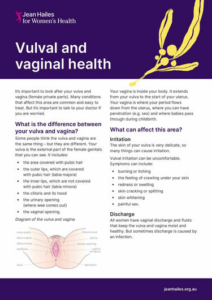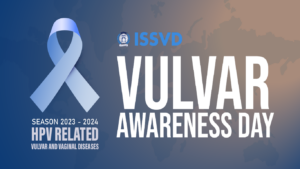“Vulval irritation
is when different products and chemicals
affect the sensitive skin of the vulva”.1
Umbrella
What may the Vulval Irritation Umbrella include?
Depending on the Source (DotS) this Umbrella may include:
- Genital Itch
- Vestibulitis
- Vestibulodynia
- Vulva/Vulval/Vulvar Discomfort/Irritation/Pain
- Vulva/Vulval/Vulvar Skin Conditions
- Vulvar Itching
- Vulval Vestibulitis
- Vulvitis
- Vulvovaginal Discomfort/Pain
Vulva
What is the vulva?
DotS the definition of the vulva may vary. The (Australian) Jean Hailes for Women’s Health’s (JH) definition is:
“Your vulva is the external part of your female genitals that you can see. Your vagina is inside your body”.2
Vulval Irritation
What is vulval irritation?
DotS the definition of vulval irritation may vary. In Vulva Irritation: What Is Vulval Irritation? the JH explain:
What are vulval irritation symptoms?
In Vulva Irritation: Symptoms the JH explain:
- Burning
- Itching
- Redness
- Swelling
- Vaginal discomfort
- Vaginal discharge
- Skin cracking or splitting (fissuring)
- Whitening of skin (leukoplakia)
- Pain during sex (dyspareunia)”.4
Vulvitis
What is vulvitis?
DotS the definition of vulvitis may vary. In Vulvitis: Overview – What Is Vulvitis? the (United States) Cleveland Clinic’s definition is:
Cause
What can cause vulval irritation?
In Vulval Irritation: What Causes Vulval Irritation the JH note:

“Vulval irritation can be caused by many things. Common causes are listed below.
- Bodily functions…
- Products…
- Clothes…
- Skin conditions…
- Infections…
- Sexually transmitted infections (STIs)…
- Other conditions…
- Hormones…
- Medicines…
- Cancer…”.6
Douching
What is douching?
DotS the definition of douching may vary. In Douching: What Is Douching? the Office on Women’s Health, United States Department of Health and Human Services, Womenshealth.gov’s definition is:
Is douching different from washing the outside of your vagina during a bath or shower?
Yes. Womenshealth.gov explain:
Most doctors recommend that women do not douche”.8
Vulval Clinics
Are there clinics specializing in vulval conditions?
DotC (Depending on the Country) there may be clinics specializing in vulval conditions with gynecologists, dermatologists, physiotherapists and other multidisciplinary staff.
These multidisciplinary clinics may be called:
- Genito-Urinary Medicine Clinics
- Multidisciplinary Vulva/Vulval/Vulvar Clinics
- Vulva/Vulval/Vulvar Clinics
- Vulvovaginal Clinics
Health Care Provider
What if I think I have vulval irritation?
If you think you have vulval irritation, it may be in your best interest to choose to talk to your health care provider about this. The JH encourage us to seek help and explain:
The sooner you seek help, the sooner your symptoms will improve”.9
Health Topics A-Z
Where may I find Health Topics A-Z related to the Vulval Irritation?
In Health Topics A-Z you may find:
Where may I find Links related to Vulval Irritation?
Your Country may have Links similar to:
Links
This Links List to third party websites is neither comprehensive nor exhaustive. Inclusion on this Links List does not imply endorsement or recommendation. Non-inclusion on this Links List does not imply non-endorsement or non-recommendation. Third party websites are not under the control of Meno Martha International Menopause Directory. Third party websites may contain explicit medical images and/or sexual references. Please read Meno Martha International Menopause Directory’s Links Policy before proceeding to a Link. Please contact Webmaster if you experience a problem with a Link.New or Updated
- Boxers, Briefs and Bacterial Vaginosis: How Your Underwear Can Affect Your Health [07 March 2024]
- Maintaining Vulvar, Vaginal and Perineal Health: Clinical Considerations [13 February 2024]
- Vulval Irritation
- Vulval Self-Checks: How To Get To Know Your Vulva and Why You Should [17 January 2024]
- Vulval and Vaginal Conditions
- Webinars: Previous – Pay Attention on Your Way In! The Vulva Is An Important Organ Too
- 10 Embarrassing Questions You Should Ask Your Doctor
- 5 Common Problems ‘Down There’ — and Whether They Are Contagious
- 9 Tips To Keep Your Vagina and Vulva Healthy
- Advice for Daily Life
- American College of Obstetricians and Gynecologist: Your Guide To Women’s Health Straight From the Experts
- BMS TV: Urogenital Atrophy
- Boxers, Briefs and Bacterial Vaginosis: How Your Underwear Can Affect Your Health [07 March 2024]
- British Society for the Study of Vulval Disease [United Kingdom]
- Candidiasis
- Care Down There
- Douching
- Essential Information: Caring for Your Skin Down There
- Essential Information: Latex Allergy
- Essential Information: See Your Doctor If
- FAQs: Disorders of the Vulva: Common Causes of Vulvar Pain, Burning, and Itching
- FAQs: Vaginitis
- FAQs: Vulvodynia
- FAQs: Vulvovaginal Health
- Foundationforwomenscancer.org [Foundation for Women’s Cancer, United States]
- Genital Care for Women
- Genital Herpes
- Genital Herpes
- Glossary
- Gynecologic Cancers
- Health Organization for Pudendal Education
- Helpful Websites
- Hope for Patients With Pudendal Neuralgia and Pudendal Nerve Entrapment
- Hormone Replacement Therapy (HRT): Vaginal Oestrogen – Common Questions About Vaginal Oestrogen
- Hormone Replacement Therapy (HRT): Vaginal Oestrogen – How and When To Use Vaginal Oestrogen
- How Do I Deal With Vaginal Atrophy? — Ask Dr Jean
- International Society for the Study of Vulvovaginal Diseases: Patient Handouts
- International Society for the Study of Women’s Sexual Health: Find A Provider
- Lichen Sclerosis
- Lichen Sclerosis and Menopause
- Lichen Sclerosus
- Maintaining Vulvar, Vaginal and Perineal Health: Clinical Considerations
- Managing Common Vulvar Skin Conditions
- Medical Advice: Bacterial Vaginosis
- Medical Advice: Chronic Thrush (Also Known As Candida)
- Medical Advice: Lichen Planus
- Medical Advice: Lichen Sclerosus
- Medical Advice: Psoriasis
- Medical Advice: Treatment
- Medical Advice: Vulval Eczema
- Medical Advice: Vulval Pain
- Menopause: Understanding the Changes and Finding Relief | Dr Susan Davis | The Proof Podcast EP 256
- National Center for Complementary and Integrative Health: How Safe Is This Product or Practice?
- National Vulvodynia Association: For Patients: How NVA Can Help You
- Navigating Menopause: Expert Insights and Solutions | Dr Susan Davis | The Proof Podcast EP 245
- Patty Brisben Foundation for Women’s Sexual Health
- Patty Brisben Foundation for Women’s Sexual Health: Guide To Sexual Health Providers
- Pelvic Exam
- Pelvic Pain Support Network [United Kingdom]
- Pelvic Pain Support Network [United Kingdom]: Resources and Clinics
- Sexual Problems and Menopause
- Think You Have A Vaginal Infection? Here’s What You Need to Know
- Tips To Help Manage Menopause Symptoms
- Urogenital Problems
- Vaginal Dryness
- Vaginal Dryness
- Vaginal Dryness Alternative Treatments
- Vaginal Pain
- Vaginal Yeast Infection
- Vaginal and Vulval Pain: Know the Different Causes and When To Seek Help
- Vaginal and Vulvar Cancers
- Video Series-2022: Discussing Sexual Health Concerns With Your Health Care Professional
- Video Series-2023: Changes In Sexual Health After Cancer
- Video and Podcast Library: Interviews – Video: Genitourinary Syndrome of Menopause
- Vulva
- Vulva [Image]
- Vulva and Vagina
- Vulval Cancer
- Vulval Health
- Vulval Irritation
- Vulval Irritation: Treatment and Management
- Vulval Pain
- Vulval Pain
- Vulval Pain Society [United Kingdom]
 Vulval Self-Checks
Vulval Self-Checks- Vulval Self-Checks: How To Get To Know Your Vulva and Why You Should
- Vulval Self-Examination
- Vulval Self-Examination Leaflet for Women At Increased Risk of Vulval Cancer
- Vulval and Vaginal Conditions
- Vulval and Vaginal Health
- Vulvar Anatomy [+ Images]
- Vulvar Awareness Day [18 September]
- Vulvar Awareness Campaign 2023-2024: HPV Related Vulvar and Vaginal Diseases

- Vulvar Cancer
- Vulvar Cancer
- Vulvar Cancer–Patient Version [+ Image]
- Vulvitis
- Vulvitis: Management & Treatment
- Vulvodynia
- Vulvovaginal Pain Log
- Vulvovaginitis
- Webinars: Previous – Pay Attention on Your Way In! The Vulva Is An Important Organ Too
- What Causes An Irritated Vulva and How’s It Treated?
- What Everyone Should Know About Menopause Symptoms
- What’s Normal: What Is Normal Vulval & Vaginal Anatomy?
- Yeast Infection: Vaginal [Vaginal Candidiasis]
Sources
Where may I find the Sources quoted?
You may find the Sources quoted at:
Sources
- Vulval Irritation: What Is Vulval Irritation? Last Updated: 19 January 2024 | Last Reviewed: 26 April 2023. Jean Hailes for Women’s Health https://www.jeanhailes.org.au/health-a-z/vulva-vagina/vulval-irritation Accessed: 21 April 2024
- Vulval Irritation Last Updated: 19 January 2024 | Last Reviewed: 26 April 2023. Jean Hailes for Women’s Health https://www.jeanhailes.org.au/health-a-z/vulva-vagina/vulval-irritation Accessed: 21 April 2024
- Vulval Irritation: What Is Vulval Irritation? Last Updated: 19 January 2024 | Last Reviewed: 26 April 2023. Jean Hailes for Women’s Health https://www.jeanhailes.org.au/health-a-z/vulva-vagina/vulval-irritation Accessed: 21 April 2024
- Vulval Irritation: Symptoms. Last Updated: 19 January 2024 | Last Reviewed: 26 April 2023. Jean Hailes for Women’s Health https://www.jeanhailes.org.au/health-a-z/vulva-vagina/vulval-irritation Accessed: 21 April 2024
- Vulvitis: Overview – What Is Vulvitis? Last Reviewed: 21 June 2022. Cleveland Clinic https://my.clevelandclinic.org/health/diseases/15175-vulvitis Accessed: 21 April 2024
- Vulval Irritation: What Causes Vulval Irritation? Last Updated: 19 January 2024 | Last Reviewed: 26 April 2023. Jean Hailes for Women’s Health https://www.jeanhailes.org.au/health-a-z/vulva-vagina/vulval-irritation Accessed: 21 April 2024
- Douching: What Is Douching? Page Last Updated: 29 December 2022. Office on Women’s Health, United States Department of Health and Human Services, Womenshealth.gov https://www.womenshealth.gov/a-z-topics/douching Accessed: 21 April 2024
- Douching: What Is Douching? Page Last Updated: 29 December 2022. Office on Women’s Health, United States Department of Health and Human Services, Womenshealth.gov https://www.womenshealth.gov/a-z-topics/douching Accessed: 21 April 2024
- Vulval Irritation: When To See Your Doctor. Last Updated: 19 January 2024 | Last Reviewed: 26 April 2023. Jean Hailes for Women’s Health https://www.jeanhailes.org.au/health-a-z/vulva-vagina/vulval-irritation Accessed: 21 April 2024



